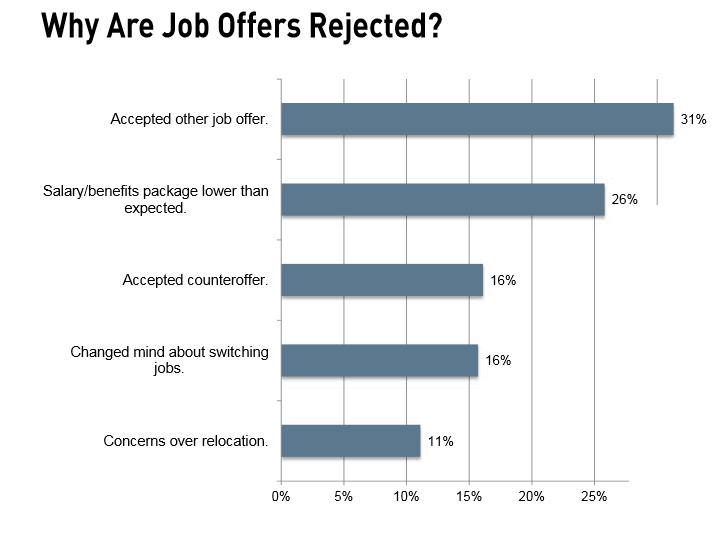 Maybe you conduct exit interviews with employees on their way out the door. Maybe you even do “stay interviews” to take the pulse of current staff. But you’re missing out on important feedback by failing to listen to another key segment—applicants who’ve rejected your job offers.
Maybe you conduct exit interviews with employees on their way out the door. Maybe you even do “stay interviews” to take the pulse of current staff. But you’re missing out on important feedback by failing to listen to another key segment—applicants who’ve rejected your job offers.
Listening to rejecters helps you gauge the effectiveness of your hiring process and increase your applicant capture rate. In many cases, the feedback is more candid than that from departing employees, who may still want a recommendation from you in the future.
Here’s what to ask … and how to ask it:
WHAT TO ASK Typical exit interview questions tend to focus on compensation, managerial style and work environment. Questions to “nonjoining” candidates should do the same, plus ask about the interview process. Examples:
- What deciding factor made you reject our offer?
- What is your impression of our work environment and culture?
- Did the compensation package meet your expectations? How could it have improved?
- What was your impression of the people who interviewed you?
HOW TO ASK
1. Always dig below the surface. The top three reasons people reject job offers, according to a 2014 MRINetwork Recruiter Sentiment Study (see chart): Accepted another job offer; Salary/benefits wasn’t enough; and Accepted a counteroffer from current employer.
But it’s easy for candidates to say money is the reason or that they took a “better offer.” Find out exactly what that means. A better base salary? Better benefits? A flexible schedule? Uncover the core issues for these candidates and how they differ according to age or job role.
2. Ask about the interview process itself. Did the interviewing managers seem prepared? Did they communicate the job’s scope and how it aligns with the organization’s strategy? If not, your candidates may be receiving mixed messages throughout the hiring process. Whether a candidate meets with one person or 10, everyone should be reading from the same page.
3. Compare expectations to reality. Ask how candidates’ expectations of the organization measured against the reality they found when interviewing. Their answers can reveal a great deal about your reputation in the job market.
Did they arrive expecting a fast-paced, entrepreneurial enterprise, only to find a highly structured and risk-averse organization? If a disparity like that exists, look closer at the ways your employees communicate your organization’s culture and recommend revisions, if necessary.
4. Eavesdrop at an online water cooler. Several websites, like Glassdoor and Vault, let employees and applicants sound off on their experience with employers. Even if your organization isn’t mentioned, the comments provide insights into what people expect from a quality employer.
WHEN TO ASK You’re most likely to get some sort of answer if you ask the person a couple questions right away during the “I’m taking my talents somewhere else” phone call. In this case, ask only a couple (maximum three) informal questions, and take good notes afterward. To get more complete results, email those applicants a simple Survey Monkey survey a day or week after they say “No thanks.”
